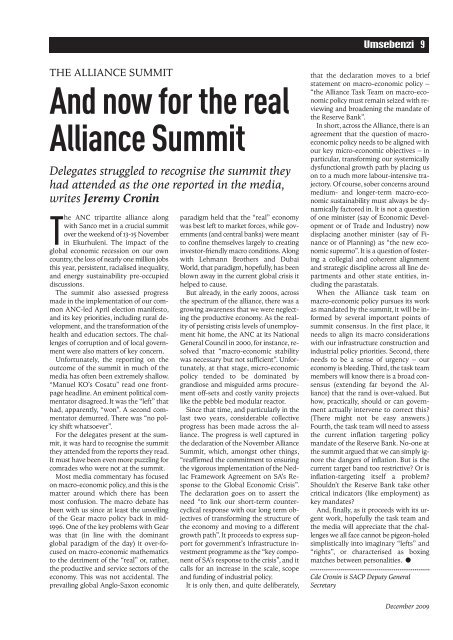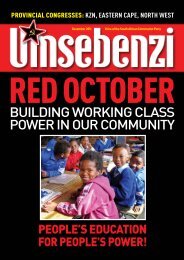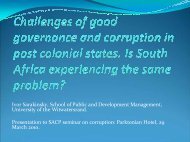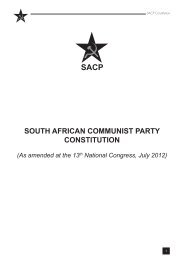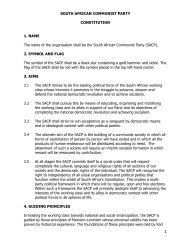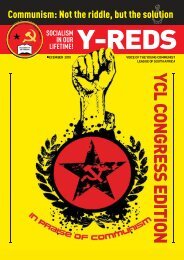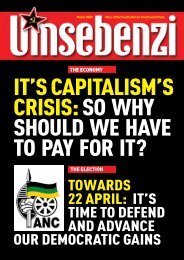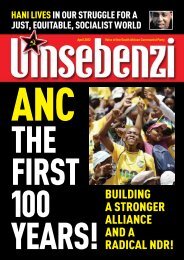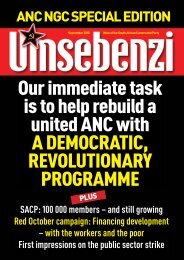Forward to Socialism!! - South African Communist Party
Forward to Socialism!! - South African Communist Party
Forward to Socialism!! - South African Communist Party
Create successful ePaper yourself
Turn your PDF publications into a flip-book with our unique Google optimized e-Paper software.
Umsebenzi 9<br />
THE ALLIANCE SUMMIT<br />
And now for the real<br />
Alliance Summit<br />
Delegates struggled <strong>to</strong> recognise the summit they<br />
had attended as the one reported in the media,<br />
writes Jeremy Cronin<br />
The ANC tripartite alliance along<br />
with Sanco met in a crucial summit<br />
over the weekend of 13-15 November<br />
in Ekurhuleni. The impact of the<br />
global economic recession on our own<br />
country, the loss of nearly one million jobs<br />
this year, persistent, racialised inequality,<br />
and energy sustainability pre-occupied<br />
discussions.<br />
The summit also assessed progress<br />
made in the implementation of our common<br />
ANC-led April election manifes<strong>to</strong>,<br />
and its key priorities, including rural development,<br />
and the transformation of the<br />
health and education sec<strong>to</strong>rs. The challenges<br />
of corruption and of local government<br />
were also matters of key concern.<br />
Unfortunately, the reporting on the<br />
outcome of the summit in much of the<br />
media has often been extremely shallow.<br />
“Manuel KO’s Cosatu” read one frontpage<br />
headline. An eminent political commenta<strong>to</strong>r<br />
disagreed. It was the “left” that<br />
had, apparently, “won”. A second commenta<strong>to</strong>r<br />
demurred. There was “no policy<br />
shift whatsoever”.<br />
For the delegates present at the summit,<br />
it was hard <strong>to</strong> recognise the summit<br />
they attended from the reports they read.<br />
It must have been even more puzzling for<br />
comrades who were not at the summit.<br />
Most media commentary has focused<br />
on macro-economic policy, and this is the<br />
matter around which there has been<br />
most confusion. The macro debate has<br />
been with us since at least the unveiling<br />
of the Gear macro policy back in mid-<br />
1996. One of the key problems with Gear<br />
was that (in line with the dominant<br />
global paradigm of the day) it over-focused<br />
on macro-economic mathematics<br />
<strong>to</strong> the detriment of the “real” or, rather,<br />
the productive and service sec<strong>to</strong>rs of the<br />
economy. This was not accidental. The<br />
prevailing global Anglo-Saxon economic<br />
paradigm held that the “real” economy<br />
was best left <strong>to</strong> market forces, while governments<br />
(and central banks) were meant<br />
<strong>to</strong> confine themselves largely <strong>to</strong> creating<br />
inves<strong>to</strong>r-friendly macro conditions. Along<br />
with Lehmann Brothers and Dubai<br />
World, that paradigm, hopefully, has been<br />
blown away in the current global crisis it<br />
helped <strong>to</strong> cause.<br />
But already, in the early 2000s, across<br />
the spectrum of the alliance, there was a<br />
growing awareness that we were neglecting<br />
the productive economy. As the reality<br />
of persisting crisis levels of unemployment<br />
hit home, the ANC at its National<br />
General Council in 2000, for instance, resolved<br />
that “macro-economic stability<br />
was necessary but not sufficient”. Unfortunately,<br />
at that stage, micro-economic<br />
policy tended <strong>to</strong> be dominated by<br />
grandiose and misguided arms procurement<br />
off-sets and costly vanity projects<br />
like the pebble bed modular reac<strong>to</strong>r.<br />
Since that time, and particularly in the<br />
last two years, considerable collective<br />
progress has been made across the alliance.<br />
The progress is well captured in<br />
the declaration of the November Alliance<br />
Summit, which, amongst other things,<br />
“reaffirmed the commitment <strong>to</strong> ensuring<br />
the vigorous implementation of the Nedlac<br />
Framework Agreement on SA’s Response<br />
<strong>to</strong> the Global Economic Crisis”.<br />
The declaration goes on <strong>to</strong> assert the<br />
need “<strong>to</strong> link our short-term countercyclical<br />
response with our long term objectives<br />
of transforming the structure of<br />
the economy and moving <strong>to</strong> a different<br />
growth path”. It proceeds <strong>to</strong> express support<br />
for government’s infrastructure investment<br />
programme as the “key component<br />
of SA’s response <strong>to</strong> the crisis”, and it<br />
calls for an increase in the scale, scope<br />
and funding of industrial policy.<br />
It is only then, and quite deliberately,<br />
that the declaration moves <strong>to</strong> a brief<br />
statement on macro-economic policy –<br />
“the Alliance Task Team on macro-economic<br />
policy must remain seized with reviewing<br />
and broadening the mandate of<br />
the Reserve Bank”.<br />
In short, across the Alliance, there is an<br />
agreement that the question of macroeconomic<br />
policy needs <strong>to</strong> be aligned with<br />
our key micro-economic objectives – in<br />
particular, transforming our systemically<br />
dysfunctional growth path by placing us<br />
on <strong>to</strong> a much more labour-intensive trajec<strong>to</strong>ry.<br />
Of course, sober concerns around<br />
medium- and longer-term macro-economic<br />
sustainability must always be dynamically<br />
fac<strong>to</strong>red in. It is not a question<br />
of one minister (say of Economic Development<br />
or of Trade and Industry) now<br />
displacing another minister (say of Finance<br />
or of Planning) as “the new economic<br />
supremo”. It is a question of fostering<br />
a collegial and coherent alignment<br />
and strategic discipline across all line departments<br />
and other state entities, including<br />
the parastatals.<br />
When the Alliance task team on<br />
macro-economic policy pursues its work<br />
as mandated by the summit, it will be informed<br />
by several important points of<br />
summit consensus. In the first place, it<br />
needs <strong>to</strong> align its macro considerations<br />
with our infrastructure construction and<br />
industrial policy priorities. Second, there<br />
needs <strong>to</strong> be a sense of urgency – our<br />
economy is bleeding. Third, the task team<br />
members will know there is a broad consensus<br />
(extending far beyond the Alliance)<br />
that the rand is over-valued. But<br />
how, practically, should or can government<br />
actually intervene <strong>to</strong> correct this?<br />
(There might not be easy answers.)<br />
Fourth, the task team will need <strong>to</strong> assess<br />
the current inflation targeting policy<br />
mandate of the Reserve Bank. No-one at<br />
the summit argued that we can simply ignore<br />
the dangers of inflation. But is the<br />
current target band <strong>to</strong>o restrictive? Or is<br />
inflation-targeting itself a problem?<br />
Shouldn’t the Reserve Bank take other<br />
critical indica<strong>to</strong>rs (like employment) as<br />
key mandates?<br />
And, finally, as it proceeds with its urgent<br />
work, hopefully the task team and<br />
the media will appreciate that the challenges<br />
we all face cannot be pigeon-holed<br />
simplistically in<strong>to</strong> imaginary “lefts” and<br />
“rights”, or characterised as boxing<br />
matches between personalities.<br />
Cde Cronin is SACP Deputy General<br />
Secretary<br />
December 2009


